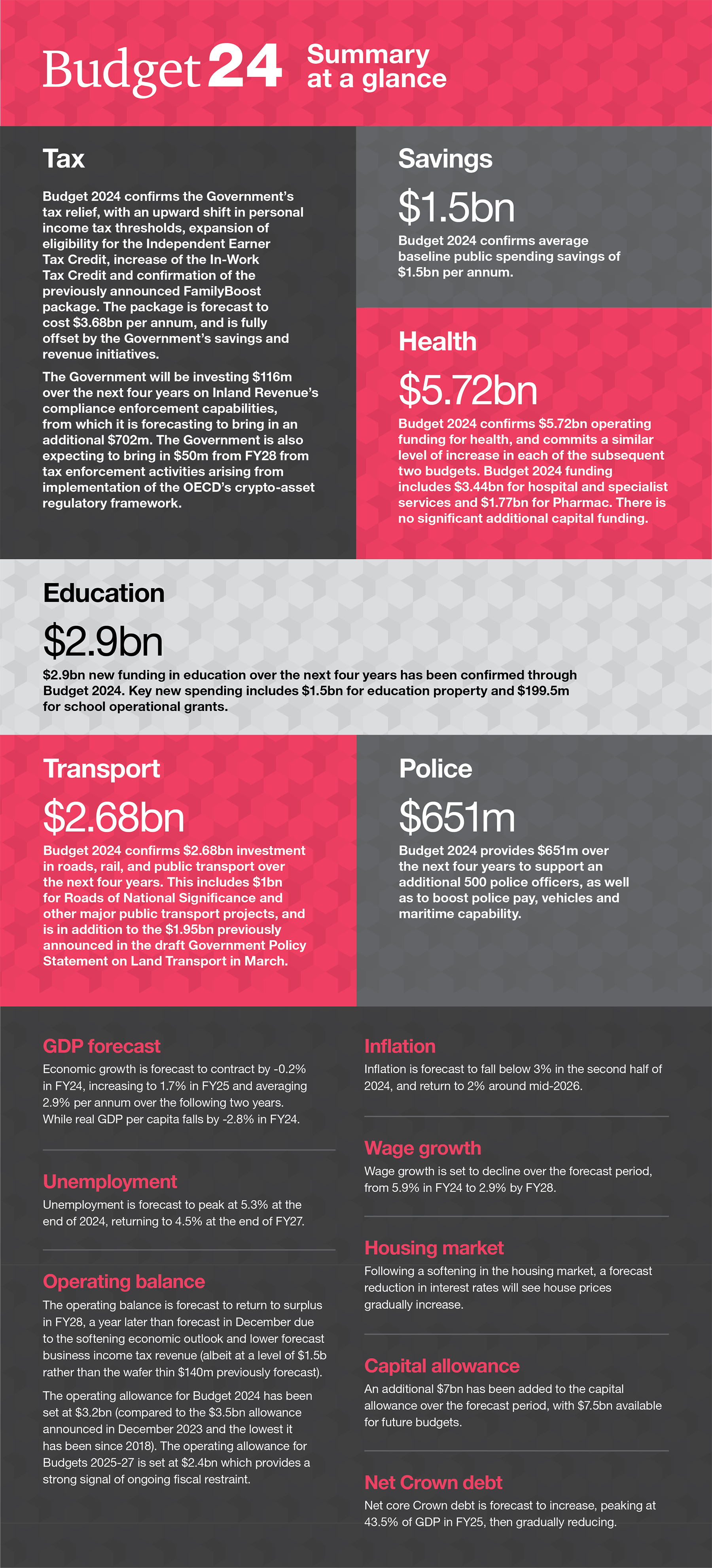New Zealand’s 2024 Budget has been announced.
The Coalition Government’s first Budget has been well-signalled, with the announcements today focused on the previously announced tax relief package alongside significant public sector savings. While limited, the new spending revealed today is focused on health, education, and law and order.
Budget 2024 confirms the Government’s tax relief, with an upward shift in personal income tax thresholds, expansion of eligibility for the Independent Earner Tax Credit, increase of the In-Work Tax Credit, and confirmation of the previously announced FamilyBoost package. The package is forecast to cost $3.68bn, and is offset by the Government’s savings and revenue initiatives. This includes baseline savings to public spending of $1.5bn on average per annum, through a total of 240 individual savings initiatives across the public sector.
The economic outlook has deteriorated, with economic growth forecast to contract by -0.2% in FY24, increasing to 1.7% in FY25, and averaging 2.9% per annum over the following two years. While real GDP per capita falls by -2.8% in FY24.
The operating balance is forecast to return to surplus in FY28, a year later than forecast in December last year due to the softening economic outlook and lower forecast business income tax revenue. To support this forecast return to surplus, the operating allowance for Budgets 2025-27 has been reduced to $2.4bn, with the Government highlighting today the need for an ongoing focus on savings and reprioritisation of public spending.

Climate and environment
While the Government has been clear on many of its priorities in Budget 2024, While the Government has been clear on many of its priorities in Budget 2024, the net picture for climate change and the environment is less positive.
The Government has expressed that they are still committed to emissions reductions and climate resilience through what they are terming “practical climate action”.
To this end they have extended the reach of the Waste Disposal Levy, allocated $1bn for cyclone and flood recovery, and linked the $1.2bn Regional Infrastructure Fund to specific climate resilience projects. The Minister of Finance has also confirmed the continuation of $2.6bn of high value initiatives previously funded by the Climate Emergency Response Fund (CERF).
However, the practice of ring fencing revenue raised from the Emissions Trading Scheme (ETS) for the CERF will be discontinued, with future investment proposals for emissions reduction or climate adaptation requiring consideration through the usual Budget process.
There are also a number of significant depletions to the climate and environment agenda, with environmentally aligned government portfolios seeing significant reductions in budget, including:
Agriculture, Biosecurity, Fisheries and Food Safety (-$99m)
Conservation (-$32m)
Environment (-$79m)
Forestry (-$11m)
Within these reductions there are a wide number of specific programmes being reduced, depowered or cancelled, including:
The National Resilience Plan,
The Climate Change Commission,
The Climate Change Development Fund,
The Climate Resilience for Maori initiative,
The Carbon Neutral Government Programme, and related programmes such as climate data infrastructure and enabling a scaled-up voluntary carbon market.
While the Government states that emissions reductions and climate change adaptation are a priority, it is less clear how these priorities will be met under this Budget.










